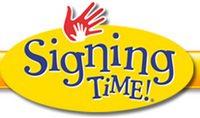 We love Signing Times. It’s a series of videos that teach basic sign language to kids. The idea emerged when Rachel Coleman discovered her daughter Leah was deaf and needed to learn ASL (American Sign Language). She created a set of kid-friendly videos to teach hundreds of signs.
We love Signing Times. It’s a series of videos that teach basic sign language to kids. The idea emerged when Rachel Coleman discovered her daughter Leah was deaf and needed to learn ASL (American Sign Language). She created a set of kid-friendly videos to teach hundreds of signs.
Penny has watched Signing Times since she was two-years old. Although she doesn’t need signs in order to communicate anymore, we still watch the videos because they’re just fun. Each of them involves Alex and Leah and lots of easy-to-learn songs. William now loves them too. Both of them find it exciting when they know something I don’t know. William is particularly enamored with the sign for helicopter, which he accompanies with the sound, “Wa-pa-pa-pa.”
I recommend Signing Times to anyone, but especially to parents of children who might take longer to “speak with their mouths.” Penny spent about two years, from around her first to her third birthday, relying primarily on signs to communicate. Now, she still has speech therapy weekly, but her speech is clear enough to be understood most of the time and we’ve believed in her desire to communicate and her ability to learn language from a very young age.
In addition, I just noticed that Louise Kinross at Bloom has an
interview with Rachel Coleman, the founder of Signing Times. Rachel is the mother of two children with special needs–Leah, who is deaf, and Lucy, who has spina bifida and cerbral palsy. I recommend the whole interview, but I will conclude with one excerpt:
“When Lucy was a baby, I was holding her while in line at a restaurant and she was arching and screaming and I was on my cell phone. A boy came up behind me and said: “Hey lady, your baby has a big head.” Lucy has hydrocephalus. I thought: Didn’t your parents teach you any manners? I’m sure the red was coming up my chest and face. I ignored him. Then he said it again: “Hey lady, your baby has a big head.” I didn’t say anything. So he taps me on the shoulder and repeats it a third time. I turned around and before I could say anything, he says: “I bet she’s going to be really smart.”
In that moment I saw how much meaning I added to his words. I thought he was mocking Lucy because she had an adult-sized head, when he was just trying to compliment her because he thought she was going to be a genius. I learned that we bring our own fears and inadequacies to what other people are saying to us. Sometimes we can’t even hear what they’re saying because our thoughts are so coloured by sadness or loss or mourning. I realized that I may think people are judging me and my kids and their disabilities, but in reality I’m judging them 100 times more before they even open their mouths. In that moment with the boy, my heart softened. I dropped my guard and let that chip fall off my shoulder.”
 We love Signing Times. It’s a series of videos that teach basic sign language to kids. The idea emerged when Rachel Coleman discovered her daughter Leah was deaf and needed to learn ASL (American Sign Language). She created a set of kid-friendly videos to teach hundreds of signs.
We love Signing Times. It’s a series of videos that teach basic sign language to kids. The idea emerged when Rachel Coleman discovered her daughter Leah was deaf and needed to learn ASL (American Sign Language). She created a set of kid-friendly videos to teach hundreds of signs. 
